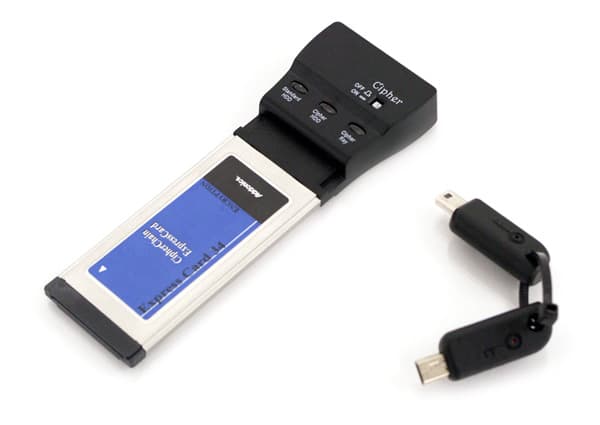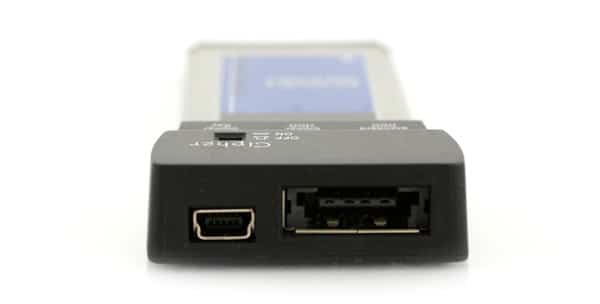
The Addonics CipherChain ExpressCard gives your ExpressCard 34/54-equipped notebook the ability to connect to eSATA or USB external storage devices. Additionally, when using an eSATA drive, the Addonics card can provide hardware-based AES 256-bit full-disk encryption. In this brief review we put this Addonics device through some quick tests to make sure it works as advertised.

The box contains the ExpressCard, two cipher keys and a sheet of instructions. You need to supply your own external hard drive or SSD. During our test, we used an OCZ Vertex 2 inside an eSATA enclosure. The included cipher keys are extremely important to keep track of as you won’t be able to access your encrypted drive without one of them inserted into the ExpressCard. Two keys are included so that you have a spare – so be smart and put the backup someplace safe. If you lose both keys, you’re out of luck. You can send a cipher key back to Addonics for them to duplicate or you can buy an optional duplicating device if you need.
The card itself is pretty straightforward. Three LEDs provide status information – LEDs for “Standard HDD”, “Cipher HDD”, and “Cipher Key” provide information about the mode in which the card is operating. A cipher switch can be toggled by using the tip of a pen. The hybrid eSATA/USB port to connect a drive and the mini-USB port to insert the cipher key are on the end of the card.
Card installation on my Windows 7 based Thinkpad T510 was easy. Driver installation happened automatically. If you have driver problems, it can be found on the Addonics website. The card supports Windows XP, Windows 2003 Server, Vista, Windows 7, and Windows 2008. If you follow the directions, you’ll have no problems. It’s important to note that the ExpressCard won’t be “detected” until you actually plugin the external drive.
Operation is also straightforward. If you want to use the drive as an encrypted drive, make sure the cipher key is inserted and the cipher switch is in the depressed, “on” position. You will have to re-initialize and reformat the drive the first time since it probably hasn’t been encrypted before. Once these steps are done, your storage device will show up in your list of drives and you can transfer data as you normally would. Encryption happens automatically and transparently.
If you want to use an unencrypted data device simply make sure that the cipher key is not inserted and the cipher switch is in the “off” position. You’ll have to disconnect the drive before any mode changes are applied.
Also note that you cannot use encryption while connecting a storage device using the USB interface.
As with any full-disk encryption, if you connect an encrypted drive while the encryption mode of the ExpressCard is disabled, the drive will not show up in Windows Explorer as it would need to be reinitialized and reformatted.
Performance wise, we ran some quick synthetic benchmarks using CrystalDiskMark. There were no significant differences in transfer speeds when using the drive as an encrypted drive or as a non-encrypted drive.
Conclusion
If you want to encrypt the data on an external eSATA drive and you use a Windows-based system, the Addonics CyperChain ExpressCard is a no-nonsense solution to achieve that. The device is easy to setup and it works well – without an impact to data transfer speeds. Having to keep track of an external cipher key may be a challenge for some, but it removes the need to have any sort of software to handle passwords.
Pros
- Easy setup
- No impact on data transfer when encrypted or not encrypted
Cons
- External cipher keys may be easy to lost/misplace for some (you know who you are)
- No encryption for USB-connected storage devices.


